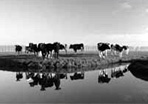It’s amazing how having kids forces one to look at things in a new light! As a new father concerned about my child’s health, I was determined to find milk that was free of hormones. After investigating the brands of milk sold at my local supermarket, I became distressed to learn that all contained milk from cows injected with rBGH — a genetically synthesized hormone produced by Monsanto to increase milk production.
One day last summer at a local county fair, I stopped into a tent to for a taste-test of a locally produced milk from a farm called Crescent Ridge. Not only was the taste far superior to the brand that I had been buying for years, it was also hormone free. I became a new customer on the spot!

Crescent Ridge Dairy is a 44-acre family-run dairy operation just outside Boston, MA. The farm has been producing and directly selling milk to local residents since the late 1800s. Once surrounded by other farms and open space, Crescent Ridge is now hemmed in by encroaching housing developments. The barn and cows even look out of place in this increasingly suburban setting. But unlike many other New England dairies that have folded over the past decade, Crescent Ridge has figured out not merely how to stay in business, but how to grow in difficult times.
The Parrish family bought Crescent Ridge (CR) in 1932. Mark Parrish is the third generation of his family that has run the farm. I recently visited Mark to better understand the challenges of dairying in New England and its prospects for the future.
CR milk gets from the cow to my breakfast table in 1-3 days. Faced with intense retail competition that blocks small producers from the supermarket shelves, CR began a home delivery service as a way to boost their business. A quality product combined with home delivery has enabled CR to be one of the few independent dairies in the region that is financially viable. CR now has 8,000 home deliveries per week.
CR produces between 225-250 gallons of milk a day. To meet the growing demand of consumers who want hormone-free milk, CR supplements its supply with milk from a Vermont dairy co-op whose farmers sign legal affidavits that they do not use rBGH. The milk is homogenized, pasteurized, bottled, and loaded onto delivery trucks at CR all in one day. Milk processed today is on my table as early as tomorrow!
I asked Mark about the challenges and future of dairying in New England. “It’s all a question about who do we want producing our milk and dairy products.” From my conversation with Mark, I learned that local dairies provide a lot more than milk, and the question of “who” has as much to do with the kind of community and natural environment we want as it does with the contents of our milk.
Local dairies like Crescent Ridge contribute to the community’s welfare in so many ways. By ensuring a locally produced milk supply, consumer dollars stay in the local community providing jobs and benefits to the community rather than draining consumers dollars away to feed the profits of a distant corporation.
Local dairy farms also cut down the need to transport milk over long distances, reducing the environmental and energy costs associated with food transport.
Local dairies preserve open space against the onslaught of suburban sprawl. Open space protects a community’s natural resources, like water and air.
“Fifty years ago we had forty farms in this community. Today we have two,” explained Mark Parrish. “Unless there is significant demand for dairy products in general, prices will continue to fall and we’ll see further erosion of our farms.” Where will our milk come from? I asked. “Like other goods that were once produced locally, our milk will come from very few sources and from very far away,” answers Parrish.
I left the Parrish farm more convinced than ever that we can make a difference with how we spend our consumer dollars. I choose local, fresh milk from a farmer I have come to know personally. Not only do I get a superior product with this choice, but also, and more importantly, I am helping in my small way to keep a local farmer on the land.
We have a long way to go to educate the public and build consumer demand for family farm products. At Farm Aid we start with Parrish’s basic question: who do we want producing our food?


